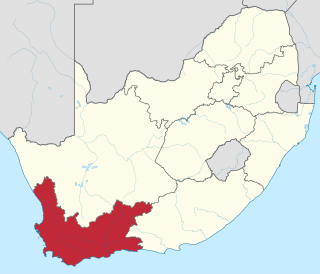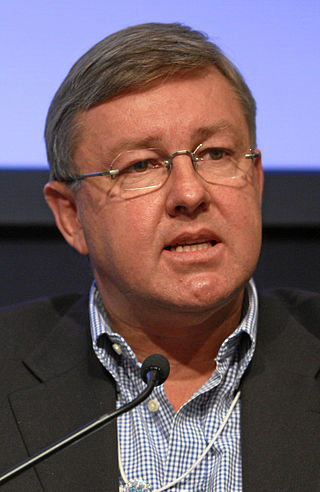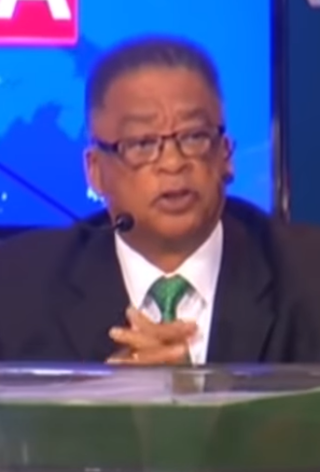Related Research Articles

The New National Party (NNP) was a South African political party formed in 1997 as the successor to the National Party, which ruled the country from 1948 to 1994. The name change was an attempt to distance itself from its apartheid past, and reinvent itself as a moderate, mainstream conservative and non-racist federal party. The attempt was largely unsuccessful, and in 2005 the New National Party voted to disband itself.

The Western Cape is a province of South Africa, situated on the south-western coast of the country. It is the fourth largest of the nine provinces with an area of 129,449 square kilometres (49,981 sq mi), and the third most populous, with an estimated 7 million inhabitants in 2020. About two-thirds of these inhabitants live in the metropolitan area of Cape Town, which is also the provincial capital. The Western Cape was created in 1994 from part of the former Cape Province. The two largest cities are Cape Town and George.

Marthinus Christoffel Johannes van Schalkwyk is a South African politician, academic, and lawyer, who serves as High Commissioner to Australia. He previously served as MP and Minister of Tourism in the Cabinet of South Africa. Formerly Premier of the Western Cape and Leader of the Opposition in the Parliament of South Africa, he was the leader of the New National Party from its inception on 8 September 1997 until its dissolution on 9 April 2005. He was appointed Minister of Environmental Affairs and Tourism in the Thabo Mbeki administration after merging his party with the ruling African National Congress (ANC), despite the poor performance of the former in the 2004 General Election.

Petrus Jacobus "Peter" Marais is a South African politician who is currently serving as a Member of the Western Cape Provincial Parliament.

The City of Cape Town is a metropolitan municipality that forms the local government of Cape Town and surrounding areas. As of the 2016 community survey, it had a population of 4,005,016.
Gerald Morkel was the Mayor of Cape Town and Premier of the Western Cape province in South Africa. He later served as a member of the Cape Town City Council for the Democratic Alliance until his retirement from politics in 2011.
Although the Democratic Alliance of South Africa in its present form is fairly new, its roots can be traced far back in South African political history, through a complex sequence of splits and mergers.

The politics of the Western Cape differs from that of most other provinces in South Africa, because, unlike the other provinces, the African National Congress (ANC) does not dominate the political landscape. The Western Cape's political landscape is also notable for the presence of a relatively strong local devolution and seperatist movement.

The 2019 Western Cape provincial election was held on 8 May 2019 to elect the 6th Western Cape Provincial Parliament. It was the sixth provincial election held since the establishment of the provincial legislature in 1994.
Kent Hercules Morkel is a retired South African politician and the son of the late politician Gerald Morkel. He served as a Member of the Western Cape Provincial Parliament. He is a member of the African National Congress (ANC). He was a member of the Democratic Alliance (DA), the New National Party (NNP) and the Labour Party (LP).
Johan Pieter Gelderblom is a South African retired politician. A former member of the New National Party, he served as a party representative in the Western Cape Provincial Parliament. From 2001 to 2004, he served as the Western Cape Minister of Agriculture and Tourism, and Environmental Affairs. After the 2004 election, he became the chairperson of the provincial parliament's Standing Committee on Public Accounts (SCOPA). He joined the African National Congress in 2005. Gelderblom served as an ANC MP from 2009 to 2014.
Paulina Wilhelmina "Pauline" Cupido is a South African politician who served in the Western Cape Provincial Parliament from 2003 to 2012, representing the African Christian Democratic Party (ACDP) from 2004 onwards. She was also the ACDP's provincial leader in the Western Cape until 2012, when she left to join the Democratic Alliance (DA).
Jacobus Johannes "Cobus" Dowry was a South African politician who served in the Western Cape Executive Council from 2002 to 2009. He served in the National Assembly from 1994 to 2002 and in the Western Cape Provincial Parliament from 2002 to 2009. He represented the National Party (NP) and New National Party (NNP) until September 2005, when he crossed the floor to the African National Congress (ANC). He was an SABC newsreader before entering politics and he was involved in commercial farming after he retired from politics in 2009.
Frederik Johannes "Frik" van Deventer is a retired South African politician who served in the National Assembly from 1994 to 2004. He represented the National Party (NP) and New National Party (NNP) until March 2003, when he crossed the floor to the Democratic Alliance (DA). He had been an organiser for the NP since the apartheid era and was a former deputy leader of the NNP in the Western Cape.
Martha Elisabet Olckers is a retired South African politician who was the Western Cape's inaugural Member of the Executive Council (MEC) for Education from 1994 to 1998. After her term in the Western Cape Provincial Parliament ended in 1999, she represented the New National Party (NNP) in the National Assembly from 1999 to 2004. She is also a former deputy leader of the NNP's Western Cape branch.
Craig Mervyn Morkel is a South African businessman and former politician. He served in the National Assembly from 1999 to 2009, representing the Western Cape constituency, before embarking on his career in business. In 2006, he was convicted of defrauding Parliament in the Travelgate scandal.
Pieter Willem Saaiman was a South African politician from the Northern Cape who served as Deputy Minister of Correctional Services from 2003 to 2004. Between 1989 and 2009, he held a variety of positions in the national and provincial governments, representing a series of parties.
Cecil Bernard Herandien is a retired South African politician who represented the New National Party (NNP) in the National Assembly from 2001 to 2005. Before that, he served in the Western Cape Provincial Parliament, where he was Member of the Executive Council (MEC) for Housing.
The 1994 Western Cape provincial election was held between 26 and 29 April 1994 to elect the 1st Western Cape Provincial Parliament. Running concurrently with the 1994 South African general election, the provincial elections were the first in which citizens of all races were allowed to take part, and were therefore also the first held with universal suffrage. The election was conducted under the direction of the Independent Electoral Commission (IEC), and marked the culmination of the four-year process that ended apartheid.
The 2004 Western Cape provincial election was held on 14 April 2004, concurrently with the 2004 South African general election, to elect the 3rd Western Cape Provincial Parliament. As of 2024, this election was the first and only time in which the African National Congress led the provincial government, as well as the most recent time that the ANC was the largest party in the Provincial Parliament.
